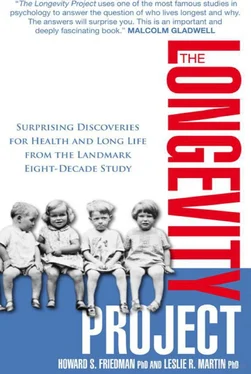Most books about health and longevity are cookbooks—literally or figuratively. When they aren’t giving you recipes (start Week 1 with spinach sautéed in garlic and olive oil) and food lists (an apple a day), they’re offering a list of ten dos and don’ts (do exercise for thirty minutes four times a week; don’t let your weight rise above a certain ratio to your height).
Exercise, diet, stress, and weight are indeed relevant to health, but in ways that vary from person to person. Lists of dos and don’ts are nearly impossible for most of us to follow for days, months, and years. Thankfully, the Terman study participants showed us that struggling with lists of specific health rules is unnecessary. The Terman men and women were born decades before running shoes, designer spas, and fancy medical tests were invented, yet many lived long, healthy lives. We’ll show why.
The point of describing our findings is not to lay out the factors that are likely to leave you the last one standing. Most of us, after all, would not wish to live extra years if they were years of constant decline and pain. But the fact is, those who live longer are also generally healthier throughout their lives. Most people who live to old age do so not because they have beaten cancer, heart disease, diabetes, or lung disease; rather, the long-lived have mostly avoided serious ailments altogether.
Because Dr. Terman began studying his participants when they were very young, many of the insights that emerged are helpful not only to adults looking to get on a healthier life path but also to those hoping to set their children on a good track. Many of our findings can help people rethink the potential long-term effects of their parenting decisions, as well as promote their whole family’s future health, happiness, and well-being.
We found that those who are healthier tend to be happier, and those who are happier tend to be healthier—but not for the reasons you might first imagine! The lives of the Terman participants open a new window to understanding the intriguing relationship between health and happiness. Our research yielded powerful suggestions for cultivating not only a long life but also a successful, meaningful, and productive life.
When Dr. Terman began studying Patricia and John and these hundreds of other bright boys and girls in California, he collected all sorts of valuable information about the children’s families, schooling, and activities. He recorded how many books were in their houses, how active they were in their playtime, and how happy their parents’ marriages were. He measured their personalities—were they prudent, extroverted, cheerful? He then followed his participants as they grew up, made career choices, and had families of their own.
When he launched the study in 1921, Dr. Terman was in his midforties. He died in 1956, but the project continued, carried on by others. We began serious work on this study in 1990 and so often use the phrases “our study” or “our project” when talking about analyses, findings, and interpretations. But this is not in any way intended to ignore or minimize the tremendous debt we all owe to Dr. Terman, to his collaborators, and to the Terman participants and their families.
A key to success for much of our work on better understanding health and longevity was gathering the death certificates of Terman’s study participants from states and counties across the United States. It turned out to be a very difficult and time-consuming task, as each state, county, or city agency has its own procedures and requirements for obtaining a vital-statistic document like a death certificate. (Here’s a tip: if you want to be studied by health researchers, don’t die in New York City.) But we persisted and now have this invaluable resource.
Having determined how long each of the Terman participants lived (and the precise cause of death), we were able to design and conduct a series of studies that were never before possible. We used both sophisticated statistical models and a variety of examinations of personalities, social relations, and behaviors. We looked at people who shared characteristics—those with similar personalities, say, or a history of divorce—to see whether those traits predicted their health over time. Many of our findings took us by surprise.
You may be wondering if it’s fair to generalize from these Terman study participants, who lived in different times and were mostly bright, educated, and middle class. Are the lessons of their lives applicable to people today? It depends on circumstances: a migrant farm worker with little access to education or health care, or a poverty-stricken peasant infected with HIV, has other, more significant threats to his or her health. However, most readers of this book—people who are bright, educated, and interested in health and success—are usually not that different in relevant ways from the Terman participants.
Still, of utmost importance throughout our work has been the effort to confirm that findings from our studies are highly informative for a general understanding of health and longevity. We therefore have spent much time and effort evaluating whether our results are more widely applicable. The answer is yes. We have used a number of scientific techniques to confirm this point. To validate old scales and measures, we conducted comparison studies using contemporary measures from contemporary samples of young people. We have used various statistical tests and adjustments to see if any significant limits would arise from our particular samples of participants. And, before drawing any firm conclusions, we have always compared our findings to what is more broadly known from other research.
As they grew into middle age, the Terman participants were a productive, intelligent segment of twentieth-century middle-class America. They lived through depression, war, and prosperity. They were engineers, businesspeople, housewives, lawyers, administrators, writers, teachers, and all sorts of other blue- and white-collar workers. Most were not particularly notable on a national scale, although you might recognize a few names. None won a Nobel Prize, became a national political leader, or joined the superrich, although some were very prominent in their fields of endeavor. Some died young and some lived to be a hundred.
One of the accomplished individuals in our study was Jess Oppenheimer, who worked with Lucille Ball to create the I Love Lucy show. Although the information in the data archives is strictly confidential, some of the Terman participants proudly identified themselves as part of the project. Mr. Oppenheimer was one of the best known.
Oppenheimer was born in San Francisco in 1913 and lived to age seventy-five. He spent most of his adult life in the entertainment business in Los Angeles. In the 1960s, after I Love Lucy , Jess worked on the comedy series Get Smart . He married, had children, and later wrote about his career. One hint of his broad-ranging intelligence was that he received a patent in the 1950s for his work on a teleprompterlike device, which Lucy used in reading commercials while looking into the camera lens.
The case of Jess Oppenheimer gives a good illustration of the general biographies of the people we have studied. They grew up in California and often remained there. The male participants gravitated toward what they saw as the interesting industries of the twentieth century—education, engineering, broadcasting, law, finance, aviation, and sales. Many were financially successful but many others were not. There were many clerks and some artists, policemen, and technicians. One became a truck driver.
The women, however, were often limited in their early careers by the societal expectations of the 1930s and 1940s. Accordingly, many became housewives, teachers, librarians, or secretaries. But not Shelley Smith. Ms. Smith (Stanford Class of 1936) went to work for Life magazine, where she met and married the photographer Carl Mydans. Covering World War II in Asia, she was captured by the Japanese in Manila and spent many months in a prisoner-of-war camp. Yet she lived a long life and died in 2002 at age eighty-six, survived by her husband, a son, a daughter, four grandchildren, and even one great-grandchild. 2 2 The New York Times obituary of Shelley Smith Mydans was published on March 9, 2002.
Читать дальше











